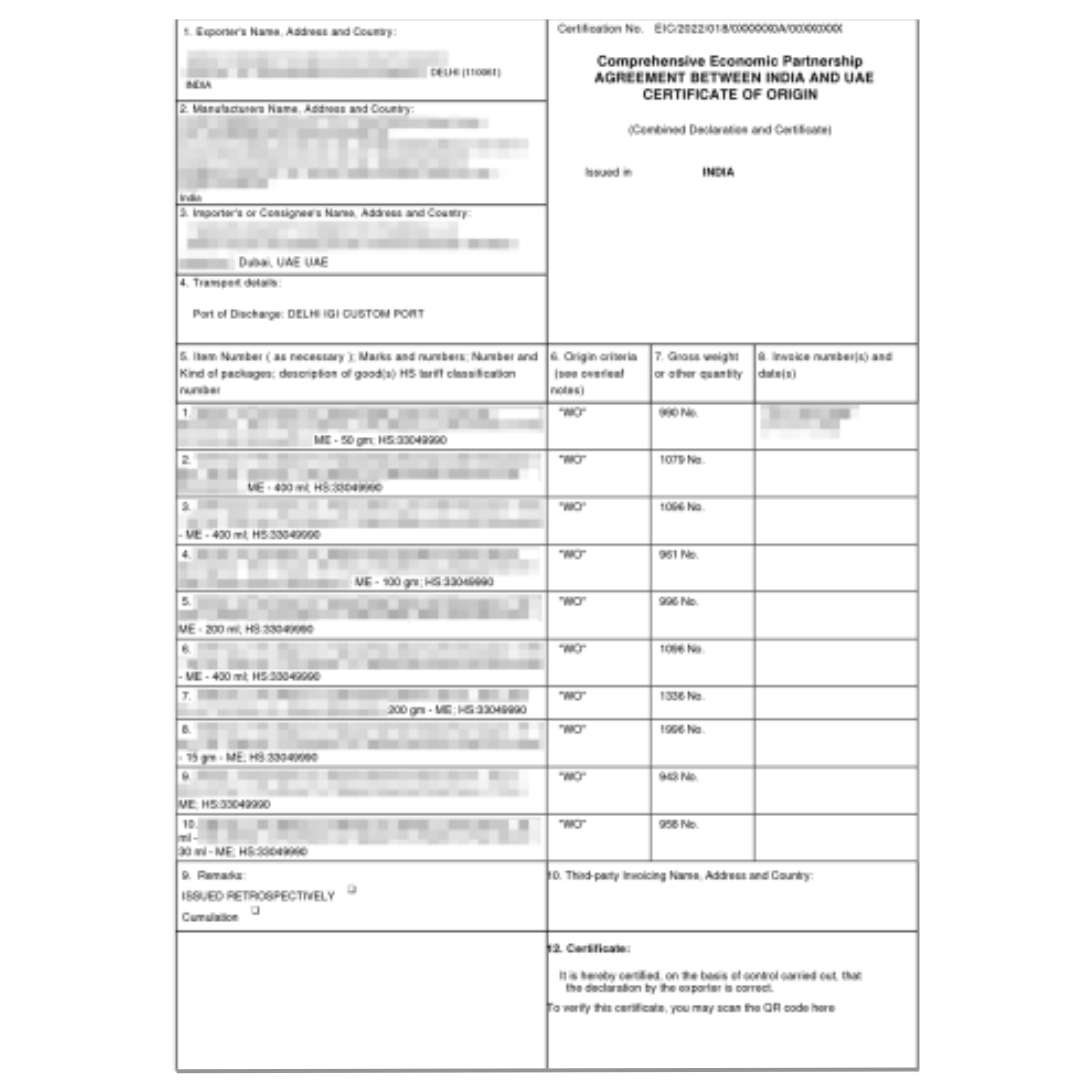Certificate Of Origin
A Certificate of Origin is a document issued by an authorized party, such as a chamber of commerce or a customs authority, to certify the country of origin of goods. It serves as proof that the goods originated from a particular country, which can be crucial for determining tariffs, trade agreements, and adherence to regulations. Businesses often require this document when exporting goods to demonstrate compliance with trade requirements and to benefit from preferential treatment under trade agreements.
Certificate of Origin - How to get one?
A certificate of origin is an essential legal document provided to exporter of manufactured goods to authenticate the origin of the product. This document includes crucial information such as the original manufacturer's details, the location where the goods were produced, and the intended destination of the commodities. The certificate serves as proof to customs authorities and trade partners, ensuring compliance with trade agreements, import regulations, and tariff policies. It plays a vital role in verifying the authenticity and traceability of goods, promoting fair trade practices, and facilitating international trade transactions with transparency and credibility.

IEC Certificate Sample

Benefits of Certificate of origin
- Tariff Reduction: The certificate of origin helps exporters qualify for preferential tariff rates or duty exemptions under trade agreements or preference programs. This reduces the cost of importing goods and enhances competitiveness in foreign markets.
- Compliance with Import Regulations: Many countries have specific import regulations, including labeling, packaging, or safety standards. The certificate of origin provides necessary information to demonstrate compliance with these requirements, ensuring smooth customs clearance and avoiding potential trade barriers.
- Access to Trade Benefits: Some trade agreements or programs may offer additional benefits beyond tariff reduction, such as access to government incentives, subsidies, or quotas. The certificate of origin serves as proof of eligibility for these benefits.
- Authenticity and Traceability: The certificate of origin establishes the authenticity of the goods origin, providing transparency and traceability in supply chains. It helps combat counterfeiting, intellectual property infringements, and unauthorized transshipment.
- Trade Data Collection and Analysis: Certificates of origin contribute to trade data collection, enabling authorities to track and analyze trade flows. This data helps monitor market trends, evaluate the effectiveness of trade policies, and formulate strategies for economic development.


Documents required for Certificate of origin
These are the list of documents required to procure certificates of origin for respective free trade agreements.
- Digital signature certificate
- Import export Code
- Mobile No & Email Address
- Commercial Invoice
- Purchase bill with respective details
- Manufacturer exporter declaration
- Product description
- Purchase order from importer
Registration process for Certificate of origin
1 – Account ID creation:- An account will be created on the DGFT portal with DSC or any other authorized government portal to apply for certification.
2 – Documentation:- An applicant must provide valid information and required documents with the application to prove the origin of their products.
3 – Verification & authorization:- The issuing authority will assess and conduct a full inspection through a risk management system to verify & authenticate the origin of the Product.
4 – Certification:- Once the approval is granted after the verification & inspection. Authorities will issue the certificate of origin to the respective applicants. As per agreed rules under the cepa agreement. The certificate of origin registration must be in English language only. The issued certificate must have all the required details about the Product and the exporting entity.
Types of Certificates of Origin
The forms for certificates of origin (COOs) used in global trade are not standardized. However, it typically includes essential information about the shipped product, such as a tariff code, details of the exporter and importer, and the country of origin.
Non-Preferential Certificate of origin
non-preferential certificate of origin indicates that the goods being exported do not qualify for reduced tariffs or tariff-free treatment under any trade agreements between countries.If an exporting country does not have a treaty or trade agreement in place with the importing country, an ordinary COO is required. Additionally, if a specific product being shipped has been excluded from tariff relief, it must be declared using an ordinary COO.
Preferential Certificate of origin
Preferential Certificates of origin indicate the existence of a free trade agreement or reduced tariffs between countries. For example, exports between SAFTA countries under the India-UAE trade agreement.
Other Free Trade Agreements
India has enhanced its market access commitments for neighbouring service providers. These commitments provide companies with an opportunity to build market expertise and grow by international expansion. Under Free or Preferential Trade Agreement there are multiple options where certificate of origin can be generated from India for import benefits to importing companies:-
ICPTA – India Chile Preferential Trade Agreement
SAFTA – South Asia Free Trade Agreement
SAPTA – SAARC Preferential Trade Agreement
IKCEPA – India Korea Comprehensive Economic Partnership Agreement
IJCEPA – India Japan Comprehensive Economic Partnership Agreements
AIFTA – ASEAN India Free Trade Agreement
ISFTA – India Sri Lanka Free Trade Agreement
APTA – Asia Pacific Trade Agreement
GSP – Generalized System of Preferences
GSTP – Global System of Trade Preferences
IMCECA – India Malaysia Comprehensive Economic Cooperation Agreement
ISCECA – India Singapore Comprehensive Economic Cooperation Agreement
Product categorization under Certificate Of Origin
If the product meets the following criteria, it will be considered to have come from a contracting nation and be eligible for preferential treatment.
Wholly Obtained Or Produced Products, such as
- Live animals
- Agri products
- Products made of animals
- Products made of Marine animals
- Products made of natural resources
- Products produced in the territory of the country exclusively
- Products have undergone sufficient working or production according to the Product Specific Rules.
A FinTech platform that understands your need
A comprehensive package of services for starting and managing your whole business, offered to you by a firm with a long-term goal to improve the way you do business.
